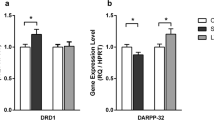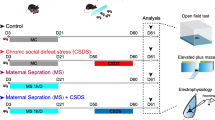Abstract
Early life adversity predisposes individuals to the development of psychopathology in later life, especially depression and anxiety disorders. Prior history of stressors may also be a vulnerability factor for developing posttraumatic stress disorder (PTSD) in response to trauma. We examined the mechanisms underlying this phenomenon by employing two animal stress models, early maternal separation followed by later time-dependent sensitization (TDS). In animals exposed to adult TDS, those with prior early adversity did not differ from controls on tests of anxiety (elevated plus maze, open field), or HPA function (ACTH and corticosterone levels). However, those with prior early adversity had increased levels of neurotrophic factors (BDNF, NGF and NT-3) in both the dorsal and ventral hippocampus. Although early adversity is known to be associated with negative effects on neuronal function, it may also be associated with an increased ability to respond to subsequent stressors with compensatory mechanisms such as increased neurotrophic factor release.




Similar content being viewed by others
References
Bannerman DM, Rawlins JNP, McHugh SB, Deacon RMJ, Yee BK, Bast T, Zhang W-N, Pothuizen HHJ, Feldon J (2004) Regional dissociations within the hippocampus—memory and anxiety. Neurosci Biobehav Rev 28:273–283
Barbany G, Persson H (1992) Regulation of neurotrophin mRNA expression in the rat brain by glucocorticoids. Eur J Neurosci 4:396–403
Brewin CR, Andrews B, Valentine JD (2000) Meta-analysis of risk factors for posttraumatic stress disorder in trauma-exposed adults. J Consult Clin Psychol 68:748–766
Cirulli F, Micera A, Alleva E, Aloe L (1998) Early maternal separation increases NGF expression in the developing rat hippocampus. Pharmacol Biochem Behav 59:853–858
Cirulli F, Alleva E, Antonelli A, Aloe L (2000) NGF expression in the developing rat brain: effects of maternal separation. Dev Brain Res 123:129–134
Daniels WM, Pietersen CY, Carstens ME, Stein DJ (2004) Maternal separation in rats leads to anxiety-like behaviour and a blunted ACTH response and altered neurotransmitter levels in response to a subsequent stressor. Metab Brain Dis 9:3–14
Duman RS, Monteggia LM (2006) A neurotrophic model for stress-related mood disorders. Biol Psychiatry 59:1116–1127
Duman RS, Heninger GR, Nestler EJ (1997) A molecular and cellular theory of depression. Arch Gen Psychiatry 54:597–606
Faure J, Uys JDK, Marais L, Stein DJ, Daniels WMU (2006) Early maternal separation followed by later stressors leads to dysregulation of the HPA-axis and increases in hippocampal NGF and NT-3 levels in a rat model. Metab Brain Dis 21:181–188
Harvey BH, Naciti C, Brand L, Stein DJ (2003) Endocrine, cognitive and hippocampal/cortical 5HT 1A/2A receptor changes evoked by a time-dependent sensitisation (TDS) stress model in rats. Brain Res 983:97–107
Heim C, Owens MJ, Plotsky PM, Nemeroff CB (1997) Persistent changes in corticotrophin-releasing factor system due to early life stress: relationship to the pathophysiology of major depression and post-traumatic stress disorder. Psychopharmacol Bull 33:185–192
Kanter ED, Wilkinson CW, Radant AD, Petrie EC, Dobie DJ, McFall ME, Peskind ER, Raskind MA (2001) Glucocorticoid feedback sensitivity and adrenocortical responsiveness in posttraumatic stress disorder. Biol Psychiatry 50:238–245
Keane TM, Barlow DH (2001) Posttraumatic stress disorder. In: Anxiety and its disorders. Guilford Press, New York
Kessler RC, Magee WJ (1993) Childhood adversities and adult depression: basic patterns of association in a US national survey. Psychol Med 23:679–690
Ladd CO, Huot RL, Thrivikraman KV, Nemeroff CB, Meaney MJ, Plotsky PM (2000) Long-term behavioural and neuroendocrine adaptations to adverse early experience. In: Progress in brain research: the biological basis for mind body interactions. Elsevier, Amsterdam
Liberzon I, Krstov M, Young EA (1997) Stress–restress: effects on ACTH and fast feedback. Psychoneuroendocrinology 22:443–453
Lo DC (1996) Neurotrophic factors and synaptic plasticity. Neuron 15:979–981
Malberg JE, Eisch AJ, Nestler EJ, Duman RS (2000) Chronic antidepressant treatment increases neurogenesis in adult rat hippocampus. J Neurosci 20:9104–9110
Mullan E, Orrell M (1996) Early life experience in elderly women with a history of depression: a pilot study using the Brief Parenting Interview. Irish J Psychol Med 13:18–20
Nibuya M, Morinobu S, Duman RS (1995) Regulation of BDNF and trk B mRNA in rat brain by chronic electroconvulsive seizure and antidepressant drug treatments. J Neurosci 15:7539–7547
Raison CL, Miller AH (2003) When not enough is too much: the role of insufficient glucocorticoid signalling in the pathophysiology of stress-related disorders. Am J Psychiatry 160:1554–1565
Roceri M, Cirulli F, Pessina C, Peretto P, Racagni G, Riva MA (2004) Postnatal repeated maternal deprivation produces age-dependent changes of brain-derived neurotrophic factor expression in selected rat brain regions. Biol Psychiatry 55:708–714
Rodgers RJ, Dalvi A (1997) Anxiety, defence and the elevated plus-maze. Neurosci Biobehav Rev 21:801–810
Roesler TA, McKenzie N (1994) Effects of childhood trauma on psychological functioning in adults sexually abused as children. J Nerv Ment Dis 182:145–150
Roskoden T, Otten U, Schwegler H (2004) Early postnatal corticosterone administration regulates neurotrophins and their receptors in septum and hippocampus of the rat. Exp Brain Res 154:183–191
Russo-Neustadt A, Ha T, Ramirez R, Kesslak JP (2001) Physical activity-antidepressant treatment combination: impact on brain-derived neurotrophic factor and behaviour in an animal model. Behav Brain Res 120:87–95
Schaaf MJ, de Jong J, de Kloet ER, Vreugdenhil E (1998) Downregulation of BDNF mRNA and protein in the rat hippocampus by corticosterone. Brain Res 813:112–120
Siuciak JA, Lewis DR, Wiegand SJ, Lindsay RM (1997) Antidepressant-like effect of brain-derived neurotrophic factor (BDNF). Pharmacol Biochem Behav 56:131–137
Trivedi MA, Coover GD (2004) Lesions of the ventral hippocampus, but not the dorsal hippocampus, impair conditioned fear expression and inhibitory avoidance on the elevated T-maze. Neurobiol Learn Mem 81:172–184
Uys JD, Muller CJ, Marais L, Harvey BH, Stein DJ, Daniels WM (2006a) Early life trauma decreases glucocorticoid receptors in rat dentate gyrus upon adult re-stress: reversal by escitalopram. Neuroscience 137:619–625
Uys JDK, Marais L, Faure J, Prevoo D, Swart P, Stein DJ, Daniels WMU (2006b) Developmental trauma is associated with behavioural hyperarousal, altered HPA axis activity and decreased hippocampal neurotrophin expression in the adult rat. Ann N Y Acad Sci 1071:542–546
Wolfe DA, Sas L, Wekerle C (1994) Factors associated with the development of posttraumatic stress disorder among child victims of sexual abuse. Child Abuse Negl 18:37–50
Yehuda R, Antelman SM (1993) Criteria for evaluating animal models of posttraumatic stress disorder. Biol Psychiatry 33:479–486
Yehuda R, Kahana B, Schmeidler J, Southwick SM, Wilson S, Giller EL (1995) Impact of cumulative lifetime trauma and recent stress on current posttraumatic stress disorder symptoms in holocaust survivors. Am J Psychiatry 152:1815–1818
Yehuda R, Golier JA, Halligan SL, Meaney M, Bierer LM (2004) The ACTH response to dexamethasone in PTSD. Am J Psychiatry 161:1397–1403
Acknowledgements
This work was supported by the National Research Foundation (NRF) and the Medical Research Council (MRC) of South Africa.
Author information
Authors and Affiliations
Corresponding author
Rights and permissions
About this article
Cite this article
Faure, J., Uys, J.D.K., Marais, L. et al. Early maternal separation alters the response to traumatization: resulting in increased levels of hippocampal neurotrophic factors. Metab Brain Dis 22, 183–195 (2007). https://doi.org/10.1007/s11011-007-9048-3
Received:
Accepted:
Published:
Issue Date:
DOI: https://doi.org/10.1007/s11011-007-9048-3




